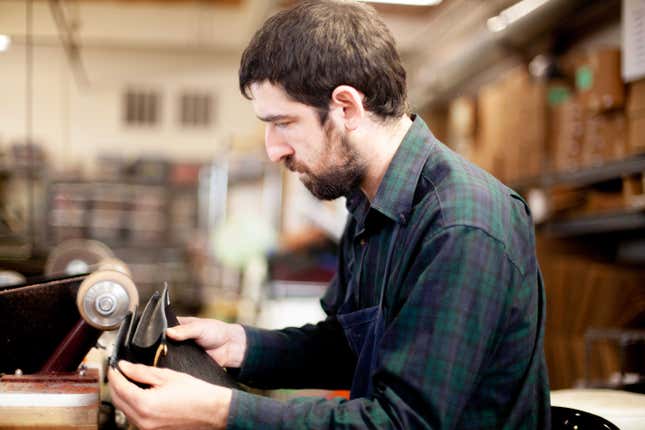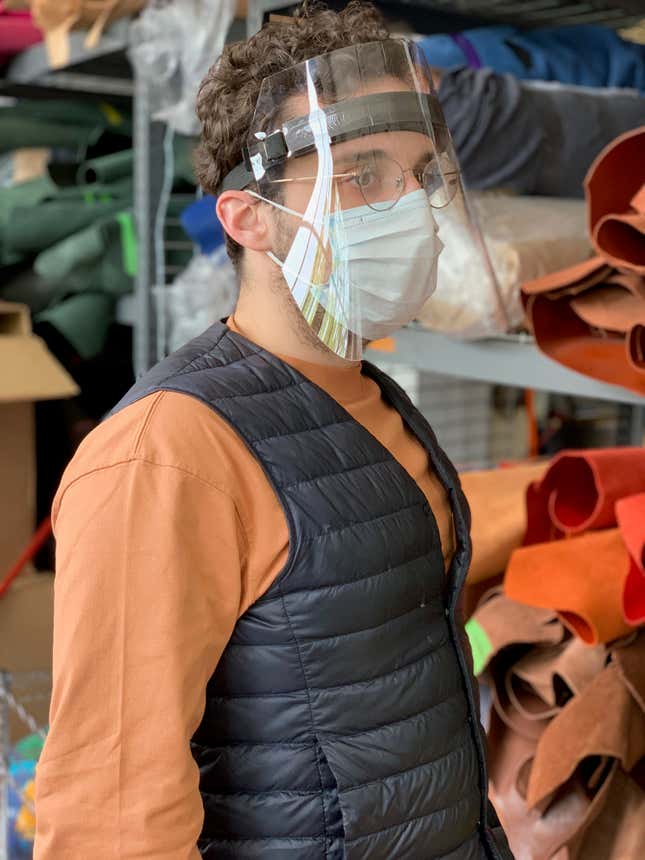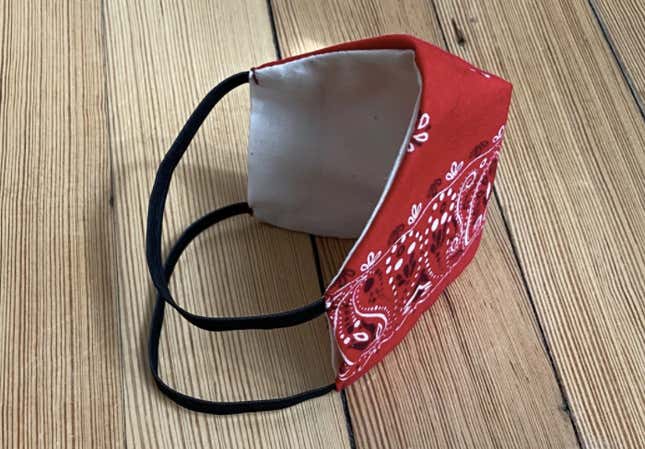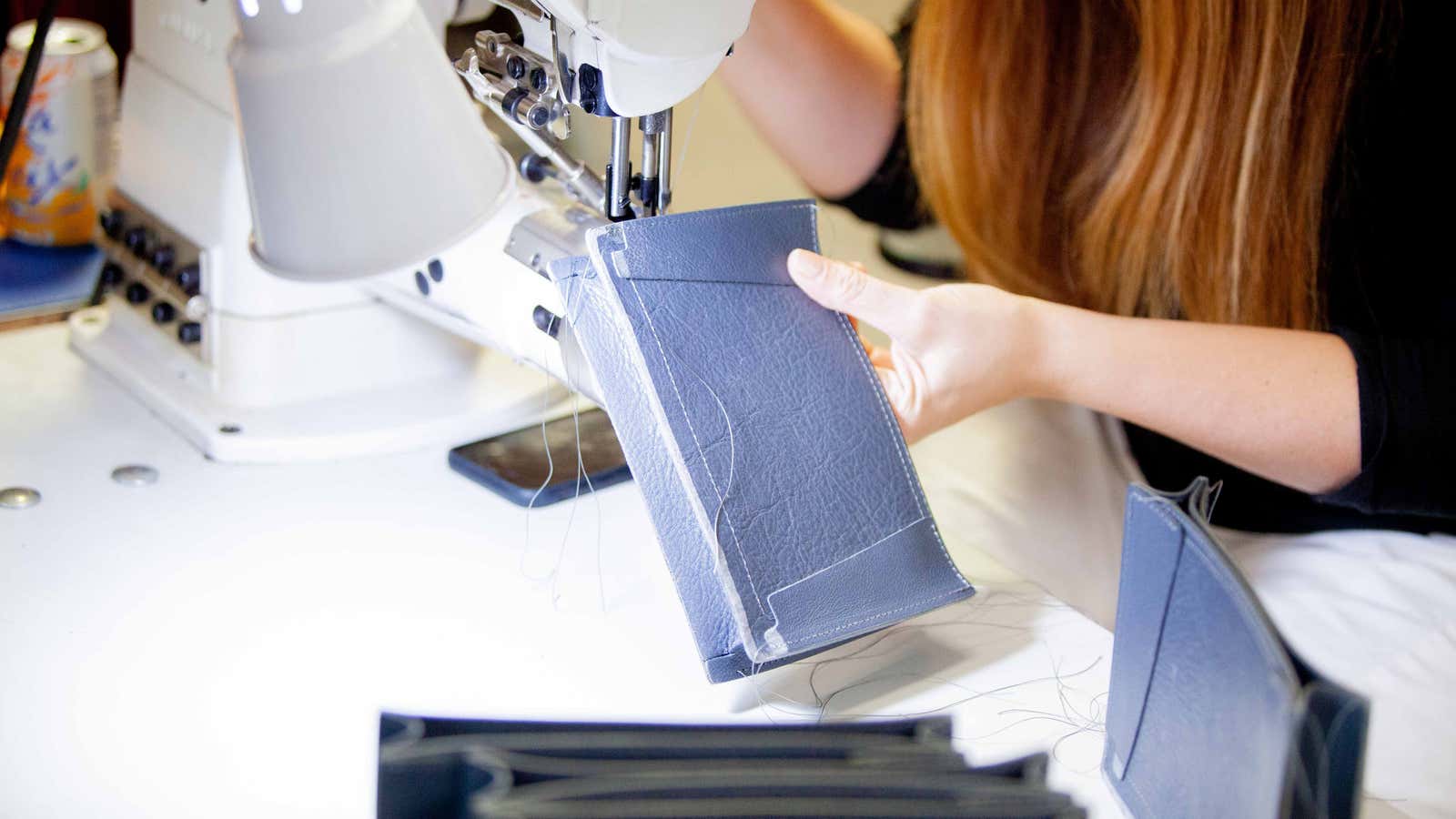There’s not a lot of demand for luxury leather bags during a pandemic.
For the past eight years, Lotuff Leather has been building up a reputation for premium totes, bucket shoulder bags, duffels, and briefcases that are made to last for generations. As recently as February, sales at the Providence, Rhode Island, company were blowing away forecasts. GQ had chosen its No. 12 weekender as the best duffel bag for travelers, praising its “just-right” shape, crafted from vegetable-tanned leather by US artisans. Meanwhile, Lotuff Leather’s $1,400 Triumph Briefcase was flying off the shelves.
Then March came along.
Sales began to nosedive, as they did for millions of companies around the planet. Lotuff CEO Ellen McNulty-Brown knew the fallout from the coronavirus pandemic had gone from bad to really bad when a customer in California called to cancel a relatively small order for a handbag.
“We’re not talking about a custom $12,000 alligator travel bag—we’re talking about a $600 handbag,” McNulty-Brown said. “We don’t have cancellations like that. So for us, it was, ‘Wow, it’s not even future orders.’ This was an order that was already in place. We were custom making it for her in a future run, and she just was so scared and she needed to cancel the order.”
By then, the US stock market was in freefall, shedding trillions of dollars of market value, tripping stock exchange circuit breakers as it dove into the fastest bear market in history. Within days, unemployment claims would begin shattering records.
After that call, McNulty-Brown knew the firm, which had 21 employees, was going have to do something more radical than slashing costs or begging the landlord for a breather on rent.
“We were looking at it and saying this is not a March issue,” McNulty-Brown recalls. “And we’ve got to address it with a larger solution, or else we were at risk of losing everything.”
Thanks to government officials who opened doors, an article on LinkedIn, and support from a fashion incubator in Arizona, the company was able to make a 360-degree pivot from luxury bags to face shields in just five days. The path forward was illuminated in one surprisingly prescient college art thesis.
Radical re-think
Legions of small businesses like Lotuff are scratching, clawing, and innovating in ingenious ways in order to stay afloat in a post-Covid 19 economy.
In Texas, a chain of burger and Mexican-food restaurants started selling staples like toilet paper, bread, and milk at its drive-throughs. Amid widespread gym closures and social distancing, Sean O’Connell, a coach and personal trainer in London, has gone digital and switched to Zoom sessions using household items—rolled up socks, or a roll of toilet paper—as props.
As companies pivot to new business lines, government policies intended to protect jobs can backfire, says Julia Rouse, a professor and employment expert at Manchester Metropolitan University in the UK. Government-sponsored furloughs, for example, can require workers to stay home, preventing businesses from coming up with a new revenue stream.
“Covid is going to change everything,” Rouse said in a phone call. “That’s why they’ve got to be allowed to keep working.”
Rouse says policy makers can help small operators adjust (Quartz member exclusive) by giving them support for spinning up online services, helping them connect with savvy peers who have successfully overhauled their business models, and making business introductions that could unlock new cashflow.
Mad scramble
Those are things that helped Lotuff pull off its pivot. McNulty-Brown says Rhode Island governor Gina Raimondo, who previously founded an early stage venture capital firm, had a team that “tried to wrap around us and guide us.” Congressman David Cicilline was opening doors, making introductions to the Federal Emergency Management Agency (FEMA) for equipment sales, and helping them process caregivers’ and quarantine-related insurance.
As the company scrambled to come up with new ideas, McNulty-Brown came across an article on LinkedIn about Louis Vuitton transitioning to products like hand sanitizer and face shields. Meanwhile, McNulty-Brown’s mother-in-law noticed a newspaper article about a fashion design incubator in Arizona called F.A.B.R.I.C. Tempe that was repurposing its workforce.
McNulty-Brown called the phone number in the paper and (accidentally) woke the founder up at 6 a.m. The incubator had already done its own research on Food and Drug Administration compliance and put Lotuff in touch with Amy Stoklas-Oakes, a consultant.
“If medical devices were not your thing, getting set up with the FDA is not a simple process and we never would have been able to do it without these two women from Arizona,” McNulty-Brown said.
While the team searched for a new product for the Covid era, Lotuff’s creative design director pulled out her 2008 design thesis.
Scarf air filtration
Back when Lotuff designer Lindy McDonough was a student at the Rhode Island School of Design, she did her thesis on the environmental impact of the fashion industry, imagining a time when walking around a city would require personal protective equipment. McDonough, whose father founded apparel maker Eastern Mountain Sports, dreamed up items like a scarf containing an air filter and a zip-up jacket with built-in hand coverings.
Her design friends thought these ideas were nuts until, 12 years later, a pandemic came along. The thesis showed that industrial design, fashion, and engineering could be married together for personal protection gear. “One of my friends that was in my thesis project texted me and he was like, ‘Your stuff is so relevant,'” McDonough says.
Face shields started to seem like a product that could work for Lotuff. The regulatory hurdles were lower compared to other medical equipment, and the company’s workers and machines could be repurposed for them. The design director’s apocalypse-inspired scarf also suggested a way forward.
McDonough’s husband, a mechanical engineer with a specialty in medical devices, collaborated on the face shields. Days later, Lotuff’s clicker press started slicing through plastic instead of leather. Not long afterwards, the company started making fashion face coverings for the general public.
Keeping skilled workers
Among McNulty-Brown’s chief concerns was losing employees the company had been training for years. Providence is considered a post-industrial city, one that lost much of its manufacturing capacity in the 20th century. There aren’t many people around these days with experience working with premium leather. It’s the kind of skill that used to be handed down by each generation, but most of the people in New England who have that pedigree are in their 50s, with nobody coming up behind them.
Lotuff had to train a new generation, taking classically trained artists with degrees in painting and jewelry, and then coaching them to work with leather.

“When you take the skill and apply it to leather goods, it’s an entirely new process and you’re training from scratch,” says McNulty-Brown. “There’s been a lot invested in developing their skills and their talents. For us, that’s going to be an investment lost if they walk out the door and go to unemployment.”
This is a critical issue for many businesses right now. When companies are forced to lay off highly-skilled workers, it can be difficult and expensive, if not impossible, to get that talent back. Workers might leave the industry to get by, or switch to a competitor.
Germany’s Kurzarbeit, which translates literally to “short-time work,” is one of the best known systems for retaining skilled workers and has been copied from Copenhagen to Tokyo. During economic downturns, employers use Kurzarbeit to reduce employee hours while the government pays most of their lost wages.
Kurzarbeit can be especially powerful in an economy with highly skilled workers, helping automotive suppliers and robotics makers keep access to specialized employees. But it can also prolong the pain, dragging out inevitable closures (at the taxpayers’ expense) if a company is no longer viable.

In the US, the primary plank for workers is unemployment benefits. Some elements of the European-style system have popped up in America in the Paycheck Protection Program (PPP), which allows forgiveness of government-backed loans if employers keep staff on the payroll. Rhode Island also had plans for a short-time working program, which Lotuff intended to participate in. The goal was to use government funding to keep its workers while figuring out new ways of pulling in revenue.
Competing with the government
Ultimately, that plan didn’t work out. Lotuff got its PPP loan approved this week, more than a month after it applied for it. McNulty-Brown says Rhode Island’s short-time working program ran out of money. Lotuff had to cut its staff from 21 workers to 11.
Meanwhile, unemployment benefits in the US have been beefed up. So much so that it’s likely that some of Lotuff’s laid-off employees, like unemployed workers elsewhere in the country, are now getting more income from government support than they were from working. Some have left Rhode Island to be with family or friends.
Kurzarbeit-style support would have allowed retention of a highly skilled workforce, McNulty-Brown said. But now she could wind up in competition with the government for these workers down the line. “It becomes incredibly challenging for us to ask people to come back when they’re looking at it and saying, ‘I’m actually making a little bit more to stay home, work on my own independent studio practice, and get paid for it.'”
Paul Krugman, the Nobel Prize winning economist, says there’s something to be said for both the US and the European approaches to supporting workers during a downturn.
“The European style presumes workers are going to go back to the same jobs they had before, that there won’t be big structural changes in the economy in the wake of the virus,” Krugman said in a call hosted by the New York Times. “It’s not clear to me that’s a really good bet to be making.”
Nobody, from government officials to venture capitalists, can guess which companies will succeed in a post-Covid economy. At Lotuff, sales of leather bags are far from what they were in February, but there are early signs of a pickup.

The company landed a contract to sell face shields that gives it some short-term stability. McDonough, the company’s designer, came up with a line of face coverings made from vintage bandanas that have been a hit. Sales of Lotuff’s sling backpack have been pandemic resistant, and McNulty-Brown expects them to gradually rebound as people go back to work.
Lotuff’s CEO says the next step is to stop “running from fire to fire” so the company can plan ahead, and perhaps eventually bring in more artist talent from RISD. She said she was grateful for government programs to help small businesses and for the officials helping enterprises make it to the other side of the crisis. Ultimately, she says survival also comes down to ingenuity and grit.
“Our business of manufacturing wasn’t built on what people gave you,” McNulty-Brown says.
